Symposium on the Regulatory Future of AI Medical Devices: Speakers
Johns Hopkins University
April 18, 2024

Symposium on the Regulatory Future of AI Medical Devices
Johns Hopkins University
April 18, 2024
Speakers
Organizers
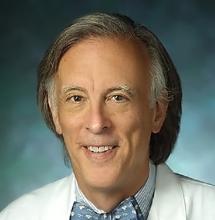
James Fackler, MD
Professor of Anesthesiology and Critical care Medicine
Johns Hopkins University School of Medicine
Jim’s areas of clinical expertise include acute respiratory distress syndrome, novel respiratory therapies, and critical care informatics. His research interests include optimizing team performance in pediatric critical care with a particular focus on sepsis. His first faculty position was at the Children's Hospital in Boston where he was an early leader in use of the internet for health data exchange and critical care monitoring. Jim returned to the Johns Hopkins faculty in 1996 to run the Extracorporeal Membrane Oxygenation program and Respiratory Therapy. He took a sabbatical to work for the Cerner Corporation developing their critical care and device integration solutions. He has founded three health care informatics-based startups and consults for other device and information integration companies. He earned his Doctor of Medicine from Rush Medical College in Chicago and completed residencies in pediatrics and anesthesiology and fellowships in pediatric intensive care and pediatric anesthesia at the Johns Hopkins University School of Medicine. He serves as an associate editor for Pediatric Critical Care Medicine. He is a member of American Association of Artificial Intelligence, American Medical Informatics Association and the Society for Critical Care Medicine. He helped found, and is on the Board of the non-profit, Machine Learning for Healthcare.

Phillip H Phan, PhD
Alonzo and Virginia Decker Professor
Carey Business School
Professor (Joint)
Johns Hopkins School of Medicine
Core Faculty, Johns Hopkins Armstrong Institute for Patient Safety and Quality
Phil’s academic and professional work focuses on innovations in patient safety and quality. He is PI of the Johns Hopkins Innovation for Substance Use Disorder (I4SUD) program, a NIDA-funded national technology commercialization training program for researchers and clinicians specializing in substance use disorders. He is co-founder of P4 Microbiome Inc, a Phase 2 peptide-based company focused on therapies for gingivitis and periodontitis in humans. He has published more than 200 peer reviewed research papers and is author/editor of 13 scholarly books. He is Deputy Editor of the International Journal for Quality in Health Care, Academic Editor of Medicine®, and Associate Editor of the Journal of Technology Transfer. Phil earned his Doctor of Philosophy from the Foster School of Business at the University of Washington.
Keynote and Panel 1: Regulators

Aldo Badano, PhD
Director, Division of Imaging, Diagnostics, and Software Reliability (DIDSR)
Office of Science and Engineering Laboratories (OSEL)
Center for Devices and Radiological Health (CDRH)
U.S. Food & Drug Administration
Aldo Badano holds a Senior Biomedical Researcher Service appointment at FDA and currently serves as Director of the Division of Imaging, Diagnostics, and Software Reliability, OSEL/CDRH. He received a PhD in Nuclear Engineering from the University of Michigan in 1999 and 1995 after obtaining a Chemical Engineering degree from the Universidad de la República, Montevideo, Uruguay in 1992. His interests are in the characterization and modeling of medical imaging systems. Aldo is a fellow of SPIE, AAPM, and AIMBE.erves as Associate Editor for several scientific journals and as a reviewer of technical grants for DOD and NIH. Dr. Badano has authored more than 150 publications and a tutorial textbook on medical displays.
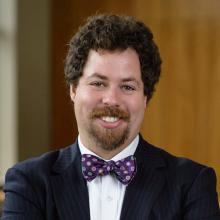
Nicholson Price, PhD, JD
Professor of Law
University of Michigan Law School
Senior Fellow
Centre for Advanced Studies in Bioscience Innovation Law, University of Copenhagen
Nicholson Price studies how law shapes biomedical innovation, especially medical AI. He teaches patents, health law, innovation in the life sciences, AI and the law, and science fiction and the law. He is a core partner at the University of Copenhagen’s Center for Advanced Studies in Biomedical Innovation Law and co-PI of the Project on Precision Medicine, Artificial Intelligence, and the Law. Price clerked for Judge Carlos T. Bea on the US Court of Appeals for the Ninth Circuit. From 2012 to 2014, he was an Academic Fellow at the Petrie-Flom Center for Health Law Policy, Biotechnology, and Bioethics at Harvard Law School, where he remains a Faculty Affiliate. He was Visiting Scholar at the UCSF / UC Hastings Consortium on Law, Science & Health Policy. Price’s work has been published in Science, Nature, Nature Biotechnology, Nature Medicine, the Columbia Law Review, the Michigan Law Review, the Iowa Law Review, the Boston College Law Review, the Harvard Journal of Law and Technology, the Hastings Center Report, and others. He holds a PhD in Biological Sciences and a JD from Columbia University.
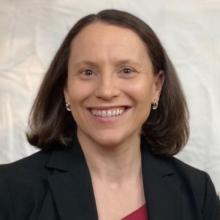
Jana Delfino, PhD
Deputy Director, Division of Imaging, Diagnostics, and Software Reliability (DIDSR)
Office of Science and Engineering Laboratories (OSEL)
Center for Devices and Radiological Health (CDRH), U.S. Food & Drug Administration
Dr. Delfino is an accomplished biomedical engineer with over a decade of experience in device regulation. Her role at DIDR is to help prioritize and direct regulatory research. Previously, she was Branch Chief, and Division Director within FDA's Center for Devices and Radiological Health (CDRH) as well as within the Biomarker Qualification Program in FDA's Center for Drug Evaluation and Research (CDER). Prior to joining FDA, she earned a PhD in Biomedical Engineering from the Georgia Institute of Technology and Emory University, where she focused on developing new MRI techniques for cardiac velocity imaging. She completed a postdoctoral fellowship in the Department of Radiology at Emory University where she applied her tools to patient selection and triage. Dr. Delfino received her bachelors from the University of California at Davis in Biological and Agricultural Engineering.
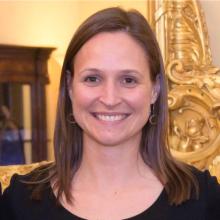
Jen Kuskowski
Head of Government Affairs, Americas
Siemens Healthineers
Jennifer is an established policy expert on complex issues in healthcare, education, and technology. Prior to her role at Siemens Healthineers, Jennifer was a senior advisor to Senate Minority Leader Mitch McConnell, where she negotiated and directed the enactment of health, commerce, and education titles in five bipartisan COVID relief bills and the repeal of the medical device tax. Jennifer also served as the health policy director for the U.S. Senate Committee on Finance and as assistant vice president for the government relations firm Venn Strategies. She holds a bachelor’s degree in Government from Franklin & Marshall College and served in the U.S. Peace Corps for two years addressing health issues in Ecuador.

Pat Baird, MBA, MA
Regulatory Head, Global Software Standards
Philips
Thinks of his job as “Policy Engineering” – understanding the unmet needs of regulators and developers, and developing standards, whitepapers, and training to meet those needs. His current projects include risk management for ML systems and ML cybersecurity considerations. He co-chairs over 10 committees related to artificial intelligence at ISO, CTA, AdvaMed, and AFDO/RAPS, and software committees on topics such as agile software development, cloud services for a regulated environment, risk management, cybersecurity, and was a sub-team lead for the IMDRF AI for Medical Devices committee. Previously he was Director of Risk Management at Baxter Healthcare. Drawing on 20 years’ experience in product development, he has published and presented over 50 papers on topics such as software development, change management, stakeholder management, and risk management. In addition to an MBA, he has a Masters in Healthcare Quality and Patient Safety from Northwestern University.
Keynote and Panel 2: Clinical Users
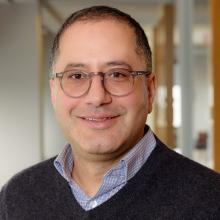
Christopher Khoury, MBA
Vice President, Strategic Insights
American Medical Association
Christopher’s work is focused on assessing emerging elements across healthcare, technology, and policy. He has worked in healthcare for 22 years. Prior to joining AMA, he was senior manager at PwC’s Health Research Institute, where he provided strategic guidance and perspective to clients on biopharmaceuticals, life sciences, health policy, and consumer issues. He began his career in medical device R&D and product development, and subsequently in health data analytics at an academic medical center. Christopher received his MBA from The Ohio State University magna cum laude. He also holds BS/MS from the University of Illinois in Electrical Engineering and MS biomedical engineering from the University of Wisconsin. Christopher serves on multiple advisory boards including Northwestern University’s Institute for Artificial Intelligence in Healthcare, American Board of Medical Specialties, and University of Illinois’ Health Technology program.
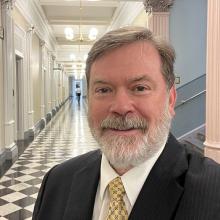
Julian Goldman, MD
Attending Anesthesiologist
Department of Anesthesia, Critical Care and Pain Medicine
Massachusetts General Hospital
Founder and Director, Center for Smart and Autonomous Medical Systems (SaAMS) and Medical Device Interoperability Program
Medical Director, Biomedical Engineering
Mass General Brigham Health System
Dr. Goldman has been promoting innovation in patient safety and clinical care by leading the development and adoption of patient-centric integrated clinical environments for over two decades. Dr. Goldman is Board Certified in Anesthesiology and Clinical Informatics. He served as a principal anesthesiologist in Mass General Hospital’s "Operating Room of the Future", developed AI-based real-time patient monitoring systems, worked as chief medical officer of a medical device company, and served as a Visiting Scholar in the FDA Medical Device Fellowship Program. He serves in leadership positions in multiple healthcare standardization and innovation organizations related to device safety and performance, interoperability, cybersecurity, and autonomy. Dr. Goldman has served on multiple Federal Advisory Committees and is an Executive Committee member of the Healthcare and Public Health Sector Coordinating Council Cybersecurity Working Group.
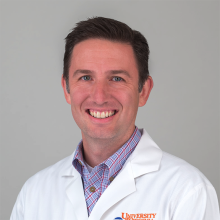
Michael C. Spaeder, MD
Professor of Pediatrics
University of Virginia School of Medicine
Dr. Spaeder’s research, based in the Center for Advanced Medical Analytics at UVA, focuses on the use of physiologic monitoring data and predictive analytics to identify patients at risk for clinical deterioration. He is a physician in the pediatric intensive care unit at UVA Health Children’s Hospital and Fellowship Director for pediatric critical care medicine at UVA. He received his bachelor’s in mathematics from Trinity College and his master’s in statistics and doctor of medicine from the George Washington University. He completed pediatrics residency at Hasbro Children's Hospital at the Alpert Medical School of Brown University and pediatric critical care at the Johns Hopkins Hospital. He is board certified in pediatric medicine and pediatric critical care by the American Board of Pediatrics.
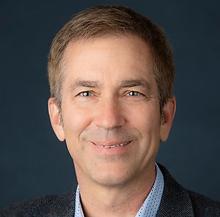
Jeremy David Walston, MD
Raymond and Anna Lublin Professor of Geriatric Medicine & Gerontology
Professor of Medicine
Johns Hopkins University and Medicine
Dr. Walston is Director of the Johns Hopkins Artificial Intelligence Collaboratory for Aging Research, Director of the Johns Hopkins Human Aging Project (HAP), and principal investigator of the Johns Hopkins Older Americans Independence Center, and the co-director of the Biology of Healthy Aging program. His research focuses on how age-related changes in inflammation, mitochondria, and the renin-angiotensin system influence resiliency and frailty in older adults. He helped define the most commonly utilized frailty measurement in older adults and has identified dysregulated energy metabolism and stress response pathways as characteristics of frailty. His clinical focus is in Geriatric Medicine and Rehabilitation, in developing care management pathways that better protect older adults, and in developing and promoting guidelines that help to promote a long and healthy life. He received the Doctor of Medicine from the University of Cincinnati College of Medicine, and complete residency and fellowship in Geriatric Medicine and Gerontology at the Johns Hopkins University School of Medicine. He has published more than 600 articles garnering more than 70,000 citations.
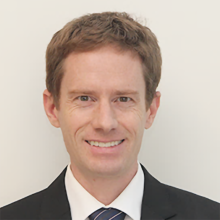
Robert Ochs, PhD
Director, Division of Radiological Health
Center for Devices and Radiological Health
U.S. Food and Drug Administration
Dr. Ochs’ interests include translational research and outreach to support the validation of new diagnostic imaging equipment and image analysis software. DRH is responsible for pre-market review, compliance, and post-market surveillance for radiological medical devices (e.g., CT, MRI, mammography, ultrasound, radiation oncology devices, and radiological image analysis software) as well as the regulation of non-medical radiation emitting electronic products (e.g., lasers, microwaves). The division actively participates in regulatory research, policy development, international standards development, and professional committees to advance the safety and effectiveness of radiological devices. He is pleased to be able to engage with experts to discuss policies that will protect and promote public health by advancing the availability of safe and effective medical devices. He received his Ph.D. in Biomedical Physics from the University of California, Los Angeles.
Keynote and Panel 3: Innovators

Peter Shen
Senior Vice President and General Manager
Digital & Automation North America
Siemens Healthineers
In his successful 25-year career in healthcare digitalization, Peter has held several executive management positions in sales, marketing and innovation, specifically focused on the introduction of new and emerging technologies to the healthcare market, including solutions in Imaging IT, 3D Advanced Visualization, Data Analytics, Digital Ecosystems and Artificial Intelligence. Peter is an industry leader in Healthcare Imaging IT, engaging with major health providers and leading technology partners and routinely speaking at healthcare conferences and events. Recently Peter testified before the US House Energy & Commerce Subcommittee on Health’s hearing on “Understanding How AI is Changing Healthcare” and before the US Senate Finance Committee’s hearing on “Artificial Intelligence and Health Care: Promise and Pitfalls”. He holds degrees in Biomedical Engineering and Mathematical Sciences from Johns Hopkins University. He serves as committee member of CMS - Medicaid Information Technology Architecture (MITA).

Venk Varadan
Co-founder and CEO
Nanowear
Venk co-founded Nanowear, a New York-based company pioneering non-invasive diagnostics and chronic disease management. Nanowear the first-and-only company in the world to receive an FDA 510(k) Class II clearance for cloth-nanotechnology-based remote monitoring. Before Nanowear, Varadan spent seven years in Technology Investment Banking, focusing exclusively on venture-backed software and communications technology in which he successfully advised growth companies in over US$3bn worth of transactions at UBS Investment Bank, Citadel Investment Group and Wells Fargo Securities in New York. Prior to his finance career, Venk spent 3 years in marketing at Eli Lilly and Sanofi Aventis Pharmaceuticals. Venk received his MBA from Columbia University and his BSE from Duke University.
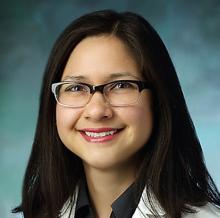
Therese L. Canares, MD
CEO and Co-Founder
Curie DX
Dr. Canares is assistant professor of emergency pediatrician at the Johns Hopkins University School of Medicine. Her early research focus was on health services research, specifically pediatric urgent care and retail-based care. Her current recent research concentrates on digital health and technology integration to improve pediatric care. Her area of clinical expertise is pediatric emergency medicine. She found it frustrating that EDs are overcrowded with minor conditions which could be treated at primary/urgent care, or even telehealth. But the lack of point-of-care tests, like rapid strep and urine dipsticks resulted in over-prescribing antibiotics or turning patients away. CurieDx was created to develop point-of-care screening tests for minor conditions using a smartphone to improve the quality of care at home, and give autonomy and data to patients and their providers. Therese has dedicate her career to serving the underserved and helping parents raise healthy, thriving children. She earned her M.D. from New York University School of Medicine and completed residency in pediatrics at Montefiore Medical Center and fellowship at Hasbro Children's Hospital at the Alpert Medical School of Brown University. She is Board certified in pediatric emergency medicine and pediatrics by the American Board of Pediatrics. She is a Fellow of the American Academy of Pediatrics.

Anand Iyer, PhD
Chief Analytics Officer
Welldoc
Anand has been instrumental in Welldoc’s success and the development of BlueStar®, the first FDA-cleared digital therapeutic for adults with type 2 diabetes. Since joining Welldoc in 2008, he has held core leadership positions that included President and Chief Operating Officer and Chief Strategy Officer. Prior to joining Welldoc, he served as the Director of PRTM’s wireless consulting practice for 14 years that helped companies take advantage of disruptive technologies, business models and process models enabled by advanced wireless technologies. Anand is a co-founding Board members of the Digital Therapeutics Alliance and remains on the Board. He was also founder of the In-Building Wireless Alliance, and teaches advanced wireless technology courses to senior officers in the US Department of Defense at the Institute for Defense and Business. Prior to PRTM, Anand was a member of the scientific staff at Bell Northern Research and Nortel Networks. He holds an MS and a PhD in electrical and computer engineering and an MBA from Carnegie Mellon University.
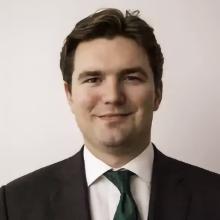
Peter Weems
Vice President, Imaging Government Affairs & Policy Strategy
AdvaMed
Prior to joining AdvaMed’s newly formed medical imaging division as an expert on regulatory and policy strategies, Peter was MITA’s (Medical Imaging and Technology Alliance) Director of Policy &Strategy, advancing regulatory and policy priorities important to the medical imaging industry. Prior to joining MITA, Peter served as an Associate with van der Walde &Co. where he provided in-depth research and analysis on federal health care payment policy. Peter earned his BA in Philosophy from James Madison University and served as a Peace Corps Volunteer in the Republic of Armenia.